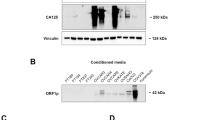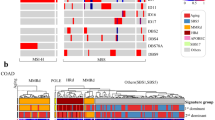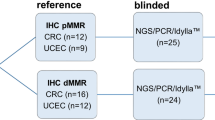Abstract
Mutations in the DNA mismatch repair gene MLH1 are a major cause of hereditary nonpolyposis colorectal cancer (HNPCC). No mutant phenotype is observed before the wild-type (wt) allele is somatically inactivated in target tissue. We addressed the mechanisms of MLH1 inactivation in 25 colorectal (CRC) and 32 endometrial cancers (ECs) from MLH1 mutation carriers (Mut1, in-frame genomic deletion; Mut2, out-of-frame splice site mutation; Mut3, missense mutation). By a quantitative method, matrix-assisted laser desorption/ionization-time-of-flight (MALDI-TOF), utilizing four intragenic single nucleotide polymorphisms and mutations, loss of heterozygosity (LOH) was present in 31/57 (54.4%) of tumors. The wt allele displayed LOH more often than the mutant allele (23/57 vs 8/57, P=0.006). For Mut1, LOH was more frequent in CRC than EC (10/11 vs 1/13, P<0.0001), whereas Mut2 and Mut3 displayed opposite LOH pattern. Moreover, although wt LOH predominated in CRC irrespective of the predisposing mutation, LOH often affected the mutant allele in EC from Mut2 and Mut3 carriers (6/19, 31.6%). MLH1 promoter methylation, which reflected a more widespread hypermethylation tendency, occurred in 4/55 (7.3%) of tumors and was inversely associated with LOH. In conclusion, the patterns of somatic events (LOH and promoter methylation) differ depending on the tissue and germline mutation, which may in part explain the differential tumor susceptibility of different organs in HNPCC. MALDI-TOF provides a novel approach for the detection and quantification of LOH.
This is a preview of subscription content, access via your institution
Access options
Subscribe to this journal
Receive 50 print issues and online access
$259.00 per year
only $5.18 per issue
Buy this article
- Purchase on Springer Link
- Instant access to full article PDF
Prices may be subject to local taxes which are calculated during checkout
Similar content being viewed by others
References
Albuquerque C, Breukel C, van der Luijt R, Fidalgo P, Lage P, Slors FJ et al. (2002). The ‘just-right’ signaling model: APC somatic mutations are selected based on a specific level of activation of the beta-catenin signaling cascade. Hum Mol Genet 11: 1549–1560.
Benedet JL, Bender H, Jones III H, Ngan HY, Pecorelli S . (2000). FIGO staging classifications and clinical practice guidelines in the management of gynecologic cancers. FIGO committee on gynecologic oncology. Int J Gynaecol Obstet 70: 209–262.
Cejka P, Stojic L, Mojas N, Russell AM, Heinimann K, Cannavo E et al. (2003). Methylation-induced G(2)/M arrest requires a full complement of the mismatch repair protein hMLH1. EMBO J 22: 2245–2254.
Chadwick RB, Pyatt RE, Niemann TH, Richards SK, Johnson CK, Stevens MW et al. (2001). Hereditary and somatic DNA mismatch repair gene mutations in sporadic endometrial carcinoma. J Med Genet 38: 461–466.
Cunningham JM, Christensen ER, Tester DJ, Kim CY, Roche PC, Burgart LJ et al. (1998). Hypermethylation of the hMLH1 promoter in colon cancer with microsatellite instability. Cancer Res 58: 3455–3460.
De Rosa M, Fasano C, Panariello L, Scarano MI, Belli G, Iannelli A et al. (2000). Evidence for a recessive inheritance of Turcot's syndrome caused by compound heterozygous mutations within the PMS2 gene. Oncogene 19: 1719–1723.
de Wind N, Dekker M, van Rossum A, van der Valk M, te Riele H . (1998). Mouse models for hereditary nonpolyposis colorectal cancer. Cancer Res 58: 248–255.
Deng G, Chen A, Hong J, Chae HS, Kim YS . (1999). Methylation of CpG in a small region of the hMLH1 promoter invariably correlates with the absence of gene expression. Cancer Res 59: 2029–2033.
Dixon LA, Dobbins AE, Pulker HK, Butler JM, Vallone PM, Coble MD et al. (2006). Analysis of artificially degraded DNA using STRs and SNPs-results of a collaborative European (EDNAP) exercise. Forensic Sci Int 164: 33–44.
Dukes C . (1932). The classification of cancer of the rectum. J Pathol Bacteriol 35: 323–332.
Esteller M, Fraga MF, Guo M, Garcia-Foncillas J, Hedenfalk I, Godwin AK et al. (2001). DNA methylation patterns in hereditary human cancers mimic sporadic tumorigenesis. Hum Mol Genet 10: 3001–3007.
Esteller M, Levine R, Baylin SB, Ellenson LH, Herman JG . (1998). MLH1 promoter hypermethylation is associated with the microsatellite instability phenotype in sporadic endometrial carcinomas. Oncogene 17: 2413–2417.
Groves C, Lamlum H, Crabtree M, Williamson J, Taylor C, Bass S et al. (2002). Mutation cluster region, association between germline and somatic mutations and genotype-phenotype correlation in upper gastrointestinal familial adenomatous polyposis. Am J Pathol 160: 2055–2061.
Hemminki A, Peltomaki P, Mecklin JP, Jarvinen H, Salovaara R, Nystrom-Lahti M et al. (1994). Loss of the wild type MLH1 gene is a feature of hereditary nonpolyposis colorectal cancer. Nat Genet 8: 405–410.
Herman JG, Umar A, Polyak K, Graff JR, Ahuja N, Issa JP et al (1998). Incidence and functional consequences of hMLH1 promoter hypermethylation in colorectal carcinoma. Proc Natl Acad Sci USA 95: 6870–6875.
Isola J, DeVries S, Chu L, Ghazvini S, Waldman F . (1994). Analysis of changes in DNA sequence copy number by comparative genomic hybridization in archival paraffin-embedded tumor samples. Am J Pathol 145: 1301–1308.
Jager AC, Bisgaard ML, Myrhoj T, Bernstein I, Rehfeld JF, Nielsen FC . (1997). Reduced frequency of extracolonic cancers in hereditary nonpolyposis colorectal cancer families with monoallelic hMLH1 expression. Am J Hum Genet 61: 129–138.
Knudson Jr AG . (1971). Mutation and cancer: statistical study of retinoblastoma. Proc Natl Acad Sci USA 68: 820–823.
Kuismanen SA, Holmberg MT, Salovaara R, de la Chapelle A, Peltomaki P . (2000). Genetic and epigenetic modification of MLH1 accounts for a major share of microsatellite-unstable colorectal cancers. Am J Pathol 156: 1773–1779.
Liu B, Parsons R, Papadopoulos N, Nicolaides NC, Lynch HT, Watson P et al. (1996). Analysis of mismatch repair genes in hereditary non-polyposis colorectal cancer patients. Nat Med 2: 169–174.
Moisio AL, Sistonen P, Weissenbach J, de la Chapelle A, Peltomaki P . (1996). Age and origin of two common MLH1 mutations predisposing to hereditary colon cancer. Am J Hum Genet 59: 1243–1251.
Nagase T, Kikuno R, Hattori A, Kondo Y, Okumura K, Ohara O . (2000). Prediction of the coding sequences of unidentified human genes. XIX. The complete sequences of 100 new cDNA clones from brain which code for large proteins in vitro. DNA Res 7: 347–355.
Nicolaides NC, Littman SJ, Modrich P, Kinzler KW, Vogelstein B . (1998). A naturally occurring hPMS2 mutation can confer a dominant negative mutator phenotype. Mol Cell Biol 18: 1635–1641.
Nystrom-Lahti M, Kristo P, Nicolaides NC, Chang SY, Aaltonen LA, Moisio AL et al. (1995). Founding mutations and Alu-mediated recombination in hereditary colon cancer. Nat Med 1: 1203–1206.
Nystrom-Lahti M, Wu Y, Moisio AL, Hofstra RM, Osinga J, Mecklin JP et al. (1996). DNA mismatch repair gene mutations in 55 kindreds with verified or putative hereditary non-polyposis colorectal cancer. Hum Mol Genet 5: 763–769.
Ohmae S, Takemoto-Kimura S, Okamura M, Adachi-Morishima A, Nonaka M, Fuse T et al. (2006). Molecular identification and characterization of a family of kinases with homology to CaMKI/CaMKIV. J Biol Chem 281: 20427–20439.
Ollikainen M, Abdel-Rahman WM, Moisio AL, Lindroos A, Kariola R, Jarvela I et al. (2005). Molecular analysis of familial endometrial carcinoma: a manifestation of hereditary nonpolyposis colorectal cancer or a separate syndrome? J Clin Oncol 23: 4609–4616.
Peltomaki P, Gao X, Mecklin JP . (2001). Genotype and phenotype in hereditary nonpolyposis colon cancer: a study of families with different vs shared predisposing mutations. Fam Cancer 1: 9–15.
Peltomaki P, Vasen H . (2004). Mutations associated with HNPCC predisposition – update of ICG-HNPCC/INSiGHT mutation database. Dis Markers 20: 269–276.
Petkovski E, Keyser-Tracqui C, Hienne R, Ludes B . (2005). SNPs and MALDI-TOF MS: tools for DNA typing in forensic paternity testing and anthropology. J Forensic Sci 50: 535–541.
Potocnik U, Glavac D, Golouh R, Ravnik-Glavac M . (2001). Causes of microsatellite instability in colorectal tumors: implications for hereditary non-polyposis colorectal cancer screening. Cancer Genet Cytogenet 126: 85–96.
Protopopov A, Kashuba V, Zabarovska VI, Muravenko OV, Lerman MI, Klein G et al. (2003). An integrated physical and gene map of the 3.5-Mb chromosome 3p21.3 (AP20) region implicated in major human epithelial malignancies. Cancer Res 63: 404–412.
Raevaara TE, Korhonen MK, Lohi H, Hampel H, Lynch E, Lonnqvist KE et al. (2005). Functional significance and clinical phenotype of nontruncating mismatch repair variants of MLH1. Gastroenterology 129: 537–549.
Renkonen E, Zhang Y, Lohi H, Salovaara R, Abdel-Rahman WM, Nilbert M et al. (2003). Altered expression of MLH1, MSH2, and MSH6 in predisposition to hereditary nonpolyposis colorectal cancer. J Clin Oncol 21: 3629–3637.
Sanchez de Abajo A, de la Hoya M, van Puijenbroek M, Godino J, Diaz-Rubio E, Morreau H et al. (2006). Dual role of LOH at MMR loci in hereditary non-polyposis colorectal cancer? Oncogene 25: 2124–2130.
Satoh J, Nanri Y, Yamamura T . (2006). Rapid identification of 14-3-3-binding proteins by protein microarray analysis. J Neurosci Methods 152: 278–288.
Schweizer P, Moisio AL, Kuismanen SA, Truninger K, Vierumaki R, Salovaara R et al. (2001). Lack of MSH2 and MSH6 characterizes endometrial but not colon carcinomas in hereditary nonpolyposis colorectal cancer. Cancer Res 61: 2813–2815.
Simpkins SB, Bocker T, Swisher EM, Mutch DG, Gersell DJ, Kovatich AJ et al. (1999). MLH1 promoter methylation and gene silencing is the primary cause of microsatellite instability in sporadic endometrial cancers. Hum Mol Genet 8: 661–666.
Suzuki H, Kawai J, Taga C, Yaoi T, Hara A, Hirose K et al. (1996). Stac, a novel neuron-specific protein with cysteine-rich and SH3 domains. Biochem Biophys Res Commun 229: 902–909.
Takagi Y, Takahashi M, Sanada M, Ito R, Yamaizumi M, Sekiguchi M . (2003). Roles of MGMT and MLH1 proteins in alkylation-induced apoptosis and mutagenesis. DNA Repair (Amst) 2: 1135–1146.
Tannergard P, Liu T, Weger A, Nordenskjold M, Lindblom A . (1997). Tumorigenesis in colorectal tumors from patients with hereditary non-polyposis colorectal cancer. Hum Genet 101: 51–55.
Toyota M, Ahuja N, Ohe-Toyota M, Herman JG, Baylin SB, Issa JP . (1999). CpG island methylator phenotype in colorectal cancer. Proc Natl Acad Sci USA 96: 8681–8686.
Utsuno H, Minaguchi K . (2004). Influence of template DNA degradation on the genotyping of SNPs and STR polymorphisms from forensic materials by PCR. Bull Tokyo Dent Coll 45: 33–46.
van Puijenbroek M, Dierssen JW, Stanssens P, van Eijk R, Cleton-Jansen AM, van Wezel T et al. (2005). Mass spectrometry-based loss of heterozygosity analysis of single-nucleotide polymorphism loci in paraffin embedded tumors using the MassEXTEND assay: single-nucletide polymorphism loss of heterozygosity analysis of the protein tyrosine phosphatase receptor type J in familial colorectal cancer. J Mol Diagn 7: 623–630.
Veigl ML, Kasturi L, Olechnowicz J, Ma AH, Lutterbaugh JD, Periyasamy S et al. (1998). Biallelic inactivation of hMLH1 by epigenetic gene silencing, a novel mechanism causing human MSI cancers. Proc Natl Acad Sci USA 95: 8698–8702.
Wheeler JM, Loukola A, Aaltonen LA, Mortensen NJ, Bodmer WF . (2000). The role of hypermethylation of the hMLH1 promoter region in HNPCC versus MSI+ sporadic colorectal cancers. J Med Genet 37: 588–592.
Wijnen J, de Leeuw W, Vasen H, van der Klift H, Moller P, Stormorken A et al. (1999). Familial endometrial cancer in female carriers of MSH6 germline mutations. Nat Genet 23: 142–144.
Yuen ST, Chan TL, Ho JW, Chan AS, Chung LP, Lam PW et al. (2002). Germline, somatic and epigenetic events underlying mismatch repair deficiency in colorectal and HNPCC-related cancers. Oncogene 21: 7585–7592.
Zhang J, Lindroos A, Ollila S, Russell A, Marra G, Mueller H et al. (2006). Gene conversion is a frequent mechanism of inactivation of the wild-type allele in cancers from MLH1/MSH2 deletion carriers. Cancer Res 66: 659–664.
Acknowledgements
We thank Saila Saarinen for expert technical assistance. Heli Surma-Aho and Katja Kuosa are acknowledged for assistance with sample collection. This study was supported by the Sigrid Juselius Foundation, the Academy of Finland, the Finnish Cancer Foundation, the Finnish Cultural Foundation, the Finnish Cultural Foundation Kymenlaakso Fund, the Paulo Foundation, the Ida Montin Foundation, the Helsinki University Funds, Swedish Research Council and Swedish Cancer Foundation.
Author information
Authors and Affiliations
Corresponding author
Additional information
Supplementary Information accompanies the paper on the Oncogene website (http://www.nature.com/onc).
Supplementary information
Rights and permissions
About this article
Cite this article
Ollikainen, M., Hannelius, U., Lindgren, C. et al. Mechanisms of inactivation of MLH1 in hereditary nonpolyposis colorectal carcinoma: a novel approach. Oncogene 26, 4541–4549 (2007). https://doi.org/10.1038/sj.onc.1210236
Received:
Revised:
Accepted:
Published:
Issue Date:
DOI: https://doi.org/10.1038/sj.onc.1210236
Keywords
This article is cited by
-
Looking beyond the cytogenetics in haematological malignancies: decoding the role of tandem repeats in DNA repair genes
Molecular Biology Reports (2022)
-
Finding the needle in a haystack: identification of cases of Lynch syndrome with MLH1 epimutation
Familial Cancer (2016)
-
Update on Lynch syndrome genomics
Familial Cancer (2016)
-
DNA hypermethylation appears early and shows increased frequency with dysplasia in Lynch syndrome-associated colorectal adenomas and carcinomas
Clinical Epigenetics (2015)
-
Microsatellite instability: an update
Archives of Toxicology (2015)



